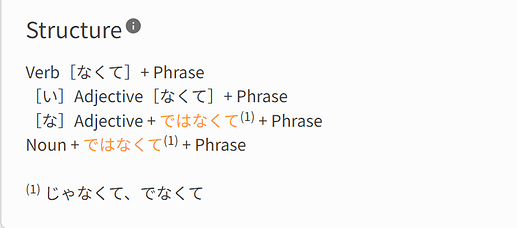not and
not so
because not
Structure
- Verb[ な
い] + くて + B- い-Adj[く な
い] + くて + B- な-Adj + で(は) なくて /じゃ なくて + B
- Noun + で(は) なくて /じゃ なくて + B
[When なくて is used with verbs it is mostly used to describes reason or cause]
[While ないで can also be used to express reason/cause, many native speakers only consider なくて to be natural]
[An adjective’s なくて form is also used to link qualities and states]
[The following clause (B) is often limited to expressing the speaker’s feelings, verbs in potential form or, in general, something beyond the control of the speaker]
[なくて is often used with 困る、嬉しい、大変、びっくり、疲れている、心配、休む、安心、◯が痛い、気持ちがいい etc.]


